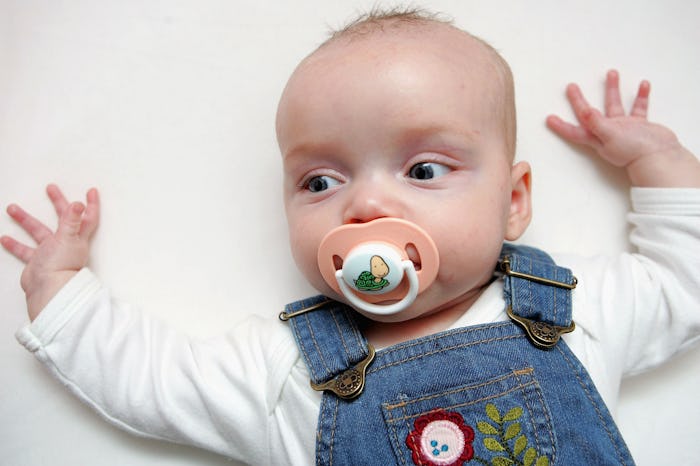Life

Here's The Deal With Letting Your Baby Use A Pacifier To Help Them Sleep
As a pregnant women preparing for motherhood, I assumed parents relied on pacifiers since always, and especially to help babies go to sleep and self-soothe. As a brand new parents to a newborn, however, I wanted to know what experts had to say about the whole pacifier attachment. So, should you let your baby sleep with a pacifier? While every baby is undoubtably different, there are some safe sleep recommendations every parent should follow.
If you're a parent who allows their babies to use and rely on pacifiers, I don't have to tell you what lifesaving, sanity-saving, miracle workers they can be. Not much soothed my first child, but if something was going to soothe them it would be a pacifier. I thought the reliance on the pacifier may have harmed our already-troublesome breastfeeding relationship, but my second kid had no trouble whatsoever doing both seamlessly, and my second used a pacifier just as frequently as my first. That's just anecdotal, though, so what does the research show? More importantly, what can that research tell you about your little one and their sleeping arrangement?
The American Academy of Pediatrics (AAP) is unequivocal in their support of pacifiers. In fact, on the AAP website it says: "Pacifiers do not cause any medical or psychological problems." Therefore, "If your baby wants to suck beyond what nursing or bottle feeding provides, a pacifier will satisfy that need." The AAP actually recommends offering a pacifier to your baby when you put them down for nighttime or nap time because it "helps reduce the risk of Sudden Infant Death Syndrome (SIDS)." The American SIDS Institute agrees, saying, "Several studies have found a lower risk of sleep-related death when babies use a pacifier." Both the AAP and the American SIDS Institute caution against using any kind of pacifier that has more than one piece, or attaches to cribs or clothing, as those can cause a risk of strangulation.
The Baby Sleep Site's Nicole Johnson says that pacifiers can be a great help, if you agree with the use of one and if your baby will take one. You should also be aware, Johnson cautions, of developing sleep associations (essentially sleep crutches that your baby will learn to rely on in order go self-soothe or put themselves to sleep) that you may have to break later on. She also refers to pacifiers as being helpful until they're hurtful. So are there problems with using pacifiers? And if so, what are they?
The main concerns about pacifier usage appear to be possible interference with breastfeeding (see above for my own experience with this), and older children having increased ear infection rates and dental problems. The Mayo Clinic says, "Normal pacifier use during the first few years of life doesn't cause long-term dental problems. However, prolonged pacifier use might cause a child's teeth to be misaligned or not come in properly." So the bottom line, says the Mayo Clinic, is as follows: when the risks start outweighing the benefits of pacifier use as your baby becomes a toddler, help your child smoothly transition away from the pacifier they've learned to love.
Until then, however, the experts agree that if the baby wants a pacifier to sleep and the parents approve, go for it!